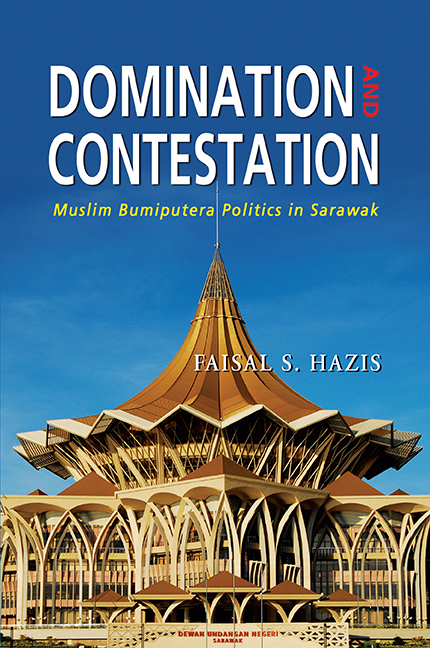Book contents
- Frontmatter
- Contents
- List of Tables
- List of Figures
- Preface
- List of Abbreviations
- 1 Introduction
- 2 State and Social Forces in Sarawak
- 3 The Resurgence of Muslim Bumiputera Politics, 1970–81
- 4 Years of Turbulence, 1981–87
- 5 Consolidation and Domination of the Muslim Bumiputera, 1987–2003
- 6 Muslim Bumiputera Politics in the Post-Mahathir Era, 2003–06
- 7 The Coastal Malays of Southwest Sarawak: A Case Study of the Muslim Bumiputera's Political Domination
- 8 Conclusion
- Postscript
- Appendices
- Bibliography
- Index
- About the Author
- Frontmatter
- Contents
- List of Tables
- List of Figures
- Preface
- List of Abbreviations
- 1 Introduction
- 2 State and Social Forces in Sarawak
- 3 The Resurgence of Muslim Bumiputera Politics, 1970–81
- 4 Years of Turbulence, 1981–87
- 5 Consolidation and Domination of the Muslim Bumiputera, 1987–2003
- 6 Muslim Bumiputera Politics in the Post-Mahathir Era, 2003–06
- 7 The Coastal Malays of Southwest Sarawak: A Case Study of the Muslim Bumiputera's Political Domination
- 8 Conclusion
- Postscript
- Appendices
- Bibliography
- Index
- About the Author
Summary
STATE POWER AND THE CONTESTATION OF SOCIAL FORCES
Most of the literature on Malaysian politics portrays the ruling regime as a powerful force that possesses hegemonic power to dominate society (Zakaria 1989; Case 1993, 2004; Crouch 1992). This study re-evaluates the strength of the Malaysian regime by aggregating its capabilities to perform four tasks, namely: to penetrate society, to regulate social relations, to extract resources, and to distribute resources in determined ways. Based on this analysis, the Malaysian regime is undoubtedly a strong state but its power is curtailed by the prevailing forces in society, known as social forces which are in constant struggle with the state over the right to dictate “social control”. The state which is usually the biggest and most powerful social organization could dominate in certain arenas but would have to compete with social forces in acquiring control over other arenas. A weak state would have no choice but to accommodate the social forces which resist its authority, failing which the state could collapse. But a strong state could either engage or ignore the contesting social forces. When a strong state engages the social forces, this would result in the weakening of the state functions and its capabilities to achieve the goals envisioned by its leader. If a strong state decides to ignore the social forces, this will not result in the collapse of the state as in the case of a weak state. Instead, the strong state might face difficulties in implementing its policies and programmes within the contested arena.
In Sarawak, the most potent social force in the early period of Independence was the Muslim Bumiputera intelligentsia who had replaced the Malay aristocrats as the new force in Sarawak politics. The intelligentsia had successfully displaced the Malay aristocrats because the latter's position had been severely weakened through the process of state formation during the Brookes’ rule. When the number of the intelligentsia soared during the British colonial rule, they started to challenge the authority of the Malay aristocrats as the undisputed leaders of Sarawak's society. Weakened, the Malay aristocrats were not able to fend off the contestation mounted by the intelligentsia who were more knowledgeable about the nitty-gritty of modern politics as compared to the traditional strongmen.
- Type
- Chapter
- Information
- Domination and ContestationMuslim Bumiputera Politics in Sarawak, pp. 267 - 274Publisher: ISEAS–Yusof Ishak InstitutePrint publication year: 2011

